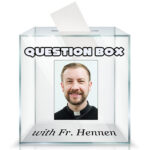By Father Thom Hennen
Question Box
How many ecumenical councils have there been? What is the difference between a Vatican council and an ecumenical council?

First, it may be helpful to explain what an ecumenical council is. The word “ecumenical” is taken from the Greek oikoumene, meaning universal or, more literally, “from the whole world.” An ecumenical council, therefore, is a gathering of the bishops (the successors of the Apostles) from throughout the world to discuss a matter of great importance for the universal Church.
There have been 21 ecumenical councils in the history of the Catholic Church. The Eastern Orthodox Churches recognize only the first seven. The first ecumenical council was the Council of Nicaea in the year 325, called by Emperor Constantine, and the most recent was the Second Vatican Council from 1962-1965, called by Pope Saint John XXIII, whose memorial we observed just last week on Oct. 11 (marking the anniversary of the opening of Vatican II).
All but the last ecumenical council were focused on doctrine, clarifying or further defining some matter of Church teaching, usually in response to some crisis or concern. The first several councils were especially about hammering out the language around our belief in the full divinity and full humanity of Jesus Christ. From the Council of Nicaea, for example, we get the term in Greek homoousios (“of the same being”) to describe the nature of Christ in relation to God the Father. This is rendered in the Latin as consubstantialem and in the current English translation of the Creed as “consubstantial” with the Father.
The Second Vatican Council was convoked specifically as a “pastoral council,” which is not to say that there was nothing doctrinal about it (the council’s documents are full of sound teaching). However, its focus was more on the pastoral application of the Church’s teaching for the modern world. It also called for an updating of some Church practices, which played out in the years following the council.
Both Vatican councils (Vatican I in 1869 and Vatican II in 1962) were ecumenical councils. They are called “Vatican” councils because they took place at the Vatican in Rome. The ecumenical councils are all named for where they took place. They couldn’t just call the Vatican councils the “councils of Rome” because five previous ecumenical councils took place in Rome, but were not at the Vatican. They were held instead at the Lateran Basilica (the Cathedral of Rome).
An ecumenical council does not need to have been called by the pope. As I mentioned, Emperor Constantine called the Council of Nicaea. The pope at the time, Pope Sylvester I, did not attend personally, but sent a legate to represent him. The same was true for many of the early councils. However, a council is considered “ecumenical” when its acts are confirmed or recognized by the pope, as the successor of Peter (see the “Catechism of the Catholic Church,” par. 884).
We should also be careful of some Catholic homophones. Some people confuse the ecumenical councils with the evangelical counsels. These are the Gospel callings of poverty, chastity and obedience, as embraced in religious life.
Also, a distinction should be made between the ecumenical councils and various synods that have taken place over the history of the Church. Synods are smaller gatherings of representative bishops. The present synod also includes a number of laity and religious among the voting members. Like councils, synods are convened to discuss specific topics and are often followed up by a “Post-Synodal Apostolic Exhortation” by the pope, in which he shares and comments on the findings of the synod.
(Father Thom Hennen serves as the pastor of Sacred Heart Cathedral in Davenport. Send questions to messenger@davenportdiocese.org)










